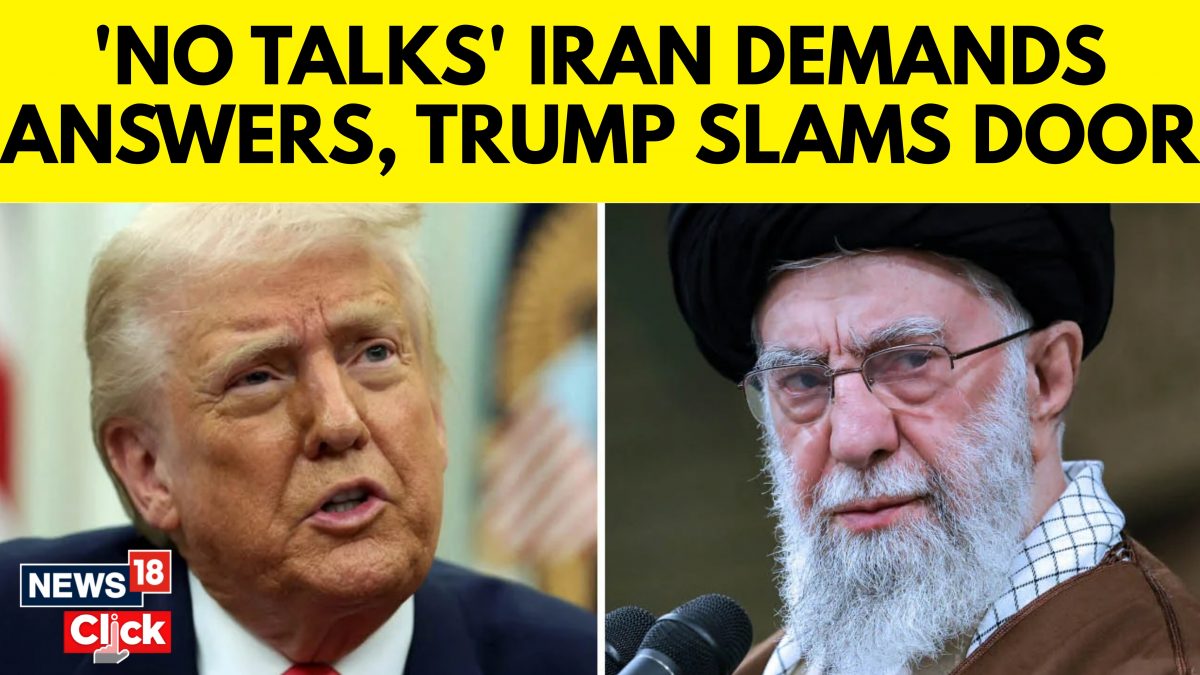Israel-Iran war live: Trump floats regime change to ‘make Iran great again’ as region braces for Iranian response to US strikes

Opening summary
Hello and welcome to our live coverage of the US and Israeli war on Iran.
US president Donald Trump has brought up the possibility of regime change in Iran following US military strikes against key Iran military sites over the weekend, even as top members of his administration insisted the US was not seeking to topple the Iranian leadership.
“It’s not politically correct to use the term, “Regime Change,” but if the current Iranian Regime is unable to MAKE IRAN GREAT AGAIN, why wouldn’t there be a Regime change??? MIGA!!!” Trump wrote in a post on his social media platform Truth Social.
Earlier, vice-president JD Vance had insisted the US was “not at war with Iran, we’re at war with Iran’s nuclear programme” while US secretary of state Marco Rubio said that that the US was “not looking for war in Iran”.
The world was meanwhile braced for Iran’s response after to the US attacks, which saw it joining Israel in the biggest western military action against the Islamic Republic since its 1979 revolution.
Speaking in Istanbul, Iranian foreign minister Abbas Araqchi said his country would consider all possible responses. There would be no return to diplomacy until it had retaliated, he said. “The US showed they have no respect for international law. They only understand the language of threat and force,” he said.
He later flew to Moscow to discuss “common threats” with President Vladimir Putin.
In other key developments:
-
Israeli prime minister Benjamin Netanyahu said that Israel is very close to meeting its goals in Iran of removing the threats of ballistic missiles and the nuclear programme. Speaking to Israeli reporters, he said: “We won’t pursue our actions beyond what is needed to achieve them, but we also won’t finish too soon. When the objectives are achieved, then the operation is complete and the fighting will stop.”
-
The UK, France and Germany have released a joint statement following American strikes on Iran’s nuclear facilities, saying that they call upon Iran to engage in negotiations leading to agreement that addresses all concerns associated with its nuclear program. The three countries also urged Iran “not to take any further action that could destabilize the region”, adding: “We have consistently been clear that Iran can never have a nuclear weapon and can no longer pose a threat to regional security.”
-
Iran’s health ministry said that the US strikes on its nuclear facilities had wounded an unspecified number of people but that none “showed any signs of radioactive contamination”. “For years, the ministry of health has set up nuclear emergency units in the nearest medical facilities to nuclear sites,” ministry spokesperson Hossein Kermanpour said on X.
-
Israel said that its fighter jets had struck “dozens” of targets across Iran on Sunday, including a long-range missile site in Yazd in the centre of the country for the first time, Agence France Presse reports. A military statement said that “approximately 30 IAF (air force) fighter jets struck dozens of military targets throughout Iran” – including “the ‘Imam Hussein’ Strategic Missile Command Center in the Yazd area, where long-range Khorramshahr missiles were stored”.
-
US secretary of state Marco Rubio said that “there are no planned military operations right now against Iran.” In a new interview with CBS, Rubio added that “no one will know for days” whether Iran had moved some of its nuclear materials prior to the strikes.
-
Iran’s parliament has reportedly approved the closing of the key strait of Hormuz shipping lane. Reuters reported Iran’s supreme national security council will make the final decision on the move, which could hamstring global trade by shutting the narrow passage between Iran and Oman.
-
Pete Hegseth, the US secretary of defence, said the impact of the air strikes was still being assessed, but that the bombing had hit the areas that had been identified in the planning of the operation. Hegseth said: “The battle damage assessment is ongoing, but our initial assessment as the chairman said is that all of our precision munitions struck where we wanted them to strike, and had the desired effect.”
-
Pete Hegseth praised Donald Trump’s leadership, and said he had overseen the “obliteration” of Iran’s nuclear ambitions. Hegseth said: “Many presidents have dreamed of delivering the final blow to Iran’s nuclear program, and none could until President Trump.”
Key events
Israel’s war on Gaza beginning to threaten its relationship with the EU

Emma Graham-Harrison
In Israel, it can seem like only one other place really matters. Washington DC is on the other side of the world but provides Israel with weapons, the backing of the most powerful military in the world, and a critical diplomatic shield in forums like the United Nations.
Yet the country’s economy is bound far more closely to Europe than to the United States. A third of its trade is with the European Union, key academic work is supported by grants from the EU’s multi-billion dollar Horizon research fund, and it is the top destination for Israelis who want to travel.
“Geography doesn’t change, and not having any partners apart from UAE in the region means Europe will always be the gateway. The US will always be 8,000km away,” said one western diplomat.
These ties have never translated into much political clout for Europe though, in part because the continent has long been hobbled by divisions over policy on Israel.
Critics of Israel’s illegal settlements and more recently its war in Gaza have repeatedly been outweighed and outvoted by a combination of older member states like Germany and Austria who are bound to Israel by history, and newer member nations, particularly Hungary, drawn by a shared ethno-nationalist vision.
“To have leverage implies that you are willing and able to use it,” said Josep Borrell, former EU policy chief. “If you can live in an illegal settlement and still travel freely to Europe, and export [products] to Europe, how do we expect them to take our condemnations seriously?”
https://preview.gutools.co.uk/world/2025/jun/23/israel-gaza-war-threatens-eu-european-union-relationship
Malaysia’s foreign ministry has urged all parties to exercise maximum restraint and avoid further escalation in the Middle East.
In a post on X, the Malaysian foreign ministry said foreign minister Mohamed Hasan had conveyed this message to his Iranian counterpart Abbas Araghchi during a meeting in Istanbul.
Malaysian prime minister Anwar Ibrahim has also called for restraint, saying that the involvement of external powers, including the United States, would only make the situation more volatile.
“If the Strait of Hormuz is blocked, it will pose a major problem to the global economy,” state news agency Bernama reported on Sunday.
The Israeli military says it is currently carrying out airstrikes on “military infrastructure” in Kermanshah, western Iran. We’ll bring you more updates when we have them.
North Korea has condemned US strikes on Iran, calling it a violation of the UN charter and blaming the tension in the Middle East on the “reckless valour of Israel”.
It marks nuclear-armed North Korea’s first commentary on the US strikes on Iranian nuclear facilities over the weekend. AFP reports:
“The Democratic People’s Republic of Korea strongly denounces the attack on Iran by the US which severely violated the UN Charter with respect for sovereignty,” said a spokesperson of the North’s foreign ministry, according to a statement carried by the state news agency.
The ongoing regional tension was an “inevitable product brought by the reckless valour of Israel”, the unnamed spokesperson added, claiming the Jewish state “has promoted its unilateral interests through ceaseless war moves and territorial expansion”.
North Korea is believed to possess dozens of nuclear warheads and various delivery systems as it faces off against South Korea and its key ally, the United States, which maintains around 30,000 troops on the peninsula.
The two Koreas remain technically at war, with the 1950-53 Korean War ending in an armistice rather than a peace treaty.
‘Chilling pattern’ of Israeli forces firing on hungry Palestinians, UN official says
There is a “chilling pattern of Israeli forces opening fire on crowds gathering to get food” the head of the UN”s humanitarian agency in Gaza and the West Bank (Ocha) has said. According to a statement issued on Sunday, Jonathan Whittall told reporters in Deir al-Balah:
The attempt to survive is being met with a death sentence … It shouldn’t be this way. There shouldn’t be a death toll associated with accessing the essentials for life.
As we reported earlier, medical sources in Gaza say about 450 people have been killed and thousands injured in the past 12 days in attacks by Israeli forces on starving people trying to collect aid from sites operated by the Gaza Humanitarian Foundation (GHF), a secretive Israeli- and US-backed private organisation.
Francesca Albanese, the UN’s special rapporteur on Palestine, wrote in a post on X on Sunday “That the state accused of genocide and starvation is left in charge of ‘distributing aid’ is ludicrous and obscene: an insult to human decency.”
Whittall also said water wells had run dry or were located in dangerous areas while sanitation systems had collapsed and disease was spreading rapidly.
He noted that partially functioning hospitals – Israeli attacks have disabled most of them – are overwhelmed by near-daily mass casualty events.
He said that humanitarian agencies had a plan capable of reaching every family in the occupied territory but “we are prevented from doing so at every turn.”
He urged the international community to press for a ceasefire and accountability for Israeli actions in Gaza adding that what is happening “appears to be the erasure of Palestinian life from Gaza.”
Edward Helmore
Mahmoud Khalil, the Palestinian rights activist, freed from Ice detention on Friday, has returned to Columbia University to renew his commitment to the cause of Palestinian freedom and opposition to both the university and the Trump administration.
Khalil arrived back in New York on Saturday after being released from more than 100 days in detention in Louisiana by a federal judge who ruled that punishing someone over a civil immigration matter was unconstitutional and ordered his immediate release on bail.
Just outside of Columbia’s gates and reunited with wife Noor Abdalla, Khalil thanked his supporters, legal team and “to salute the courage of all students at Columbia and across the nation who had continued to protest”.
Khalil made clear that following his release from detention he would battle what he called the “shameful trustees at Columbia that are currently attempting to expel 15 more students and to suspend tens of others, basically conceding their future, their degrees and labor because they are not afraid to stand for Palestine”.
The university, he added, “would do anything and everything it can to ensure that the words “free Palestine” are not uttered anywhere near it. “But while we are here, Free, Free Palestine.” The crowd followed in a chant.
Oil prices surge
AFP reports that oil prices have surged while Asian markets traded lower on concerns of disruption to energy markets after US air strikes on Iran’s nuclear facilities.
The dollar strengthened as traders assessed the weekend’s events, with Iran threatening US bases in the Middle East as fears grow of an escalating conflict in the volatile region.
Iran is the world’s ninth-biggest oil-producing country, with output of about 3.3 million barrels per day.
It exports just under half of that amount and keeps the rest for domestic consumption.
If Tehran decides to retaliate, observers say one of its options would be to seek to close the strategic Strait of Hormuz – which carries one-fifth of global oil output.
When trading opened on Monday, Brent and the main US crude contract WTI both jumped more than four percent to hit their highest price since January.
They pared these gains however and later in the morning Brent was up 2.1% at $75.43 per barrel and WTI was 2.1% higher at $78.64.

Rebecca Ratcliffe
A total of 223 Filipino nationals in Israel and eight in Iran have requested repatriation after the US struck Iranian nuclear sites on Saturday night, according to local media. At least 30,742 Filipinos are living and working in Israel, many of them in the care sector, while 1,180 are living in Iran.
The Philippines department for foreign affairs said on Sunday that it was “greatly concerned” by the developments in the Middle East and has called for diplomacy, adding that “the welfare and safety of Filipinos in the region are of primordial concern.”
Earlier, the Philippines raised its alert level in both Israel and Iran to level 3, which encourages people to opt for voluntary repatriation. “All overseas Filipinos in Israel and Iran are enjoined to return to the Philippines. Travel by Filipinos to both these countries is highly discouraged, due to the ongoing crisis and the actual closure of their air space and seaports,” the DFA said.
According to the Philippine embassy in Israel, 127 Filipinos have lost their homes following Iran’s retaliatory strikes, while one person remains in critical condition.
A first group of Filipinos is to be repatriated, mainly from Israel, on Monday.
Japan, heavily reliant on Middle East oil, avoids voicing support for US strikes

Justin McCurry
Japan has stopped short of voicing support for the US attacks on Iranian nuclear facilities at the weekend, calling instead for a de-escalation in the situation. Speaking to reporters on Sunday, the prime minister, Shigeru Ishiba, said Japan was monitoring the situation with “grave concern”.
But Ishiba declined an invitation to publicly support the US strikes, according to the Kyodo news agency, saying only that he would respond “when appropriate”. Instead, he emphasised the importance of lowering tensions in the region, adding that Iran’s development of nuclear weapons must be “blocked”.
Japan’s dependence on Middle East oil means it has had traditionally friendly relations with Iran. While the recent exchange of missile attacks between Iran and Israel have not had an immediate impact on energy supplies, any disruption to shipments of crude oil could have serious consequences for Japan, which has few energy resources of its own.
The world’s fifth-biggest economy relies on the Middle East for 90% of its crude oil imports. Ishiba said:
We are gathering and analysing information and closely monitoring developments with grave concern.
Japan’s response to Israeli airstrikes against Iran also put it at odds with other US allies. Earlier this month, Ishiba condemned Israel’s attacks on nuclear and military facilities in Iran, describing them as “absolutely unacceptable” while efforts were still being made to find a diplomatic solution to Tehran’s nuclear programme.
“This is extremely regrettable and we strongly condemn it.” Japan did, though, sign a G7 statement last week that affirmed Israel’s right to defend itself.
Japan has followed other countries in making preparations to evacuate its citizens from the region. At the weekend, two Self-Defence Force transport aircraft left for Djibouti to evacuate people from Israel and Iran. Twenty-one Japanese nationals and their family members arrived by bus in Azerbaijan from Iran on Sunday, the foreign ministry said. Last week 87 people left Iran and Israel. The ministry said about 200 Japanese remained in Iran and around 1,000 in Israel.
What is the strait of Hormuz and why does it matter?
One way Iran could retaliate to US strikes, analysts say, is to close off the strait of Hormuz, a vital trade route, through which over a fifth of the world’s oil supply, 20m barrels, and much of its liquified gas, passes each day.
Iran has in the past threatened to close the strait, which would restrict trade and impact global oil prices, but has never followed through on the threat.
About one-fifth of the world’s total oil consumption passes through the strait. Between the start of 2022 and last month, approximately 17.8 million to 20.8m barrels of crude, condensate, and fuels flowed through the strait daily, according to data from analytics firm Vortexa. Read on below:
Commercial airlines around the world are weighing how long to suspend Middle East flights after the US attack on Iran over the weekend. Reuters reports:
Singapore Airlines, one of the highest-profile in Asia, had called the situation “fluid” on Sunday as it cancelled flights from Singapore to Dubai following a security assessment.
The Middle East route has become more important for flights between Europe and Asia since Russian and Ukrainian airspace closed due to war, but flight tracking website FlightRadar24 showed empty space over Iran, Iraq, Syria and Israel.
Following US attacks on Iranian nuclear facilities, commercial traffic in the region is operating as it has since new airspace restrictions were put into place last week.
Image from 01:45 UTC 22 June. pic.twitter.com/IeJBa9kvF4
— Flightradar24 (@flightradar24) June 22, 2025
Air France KLM said on Sunday that it cancelled flights to and from Dubai and Riyadh on Sunday and Monday. British Airways, owned by IAG ICAG.L, also cancelled flights to and from Dubai and Doha for Sunday. It was still reviewing the situation, it said in a statement on Sunday evening, when asked about later flights.
Missile and drone barrages in a growing number of conflict zones represent a high risk to airline traffic, and an organization that monitors flight risks, Safe Airspace, a website run by OPSGROUP, warned on Sunday that US attacks on Iran’s nuclear sites could heighten the threat to American operators in the region.
In the days before the U.S. strikes, American Airlines suspended flights to Qatar and United Airlines did the same with flights to Dubai.
Airlines are also concerned about a potential spike in oil prices following the U.S. attacks, which will increase the cost of jet fuel.
Israel meanwhile is ramping up flights to help stranded travellers at home and abroad.
The country’s Airports Authority says that so-called rescue flights to the country would expand on Monday with 24 a day, although each flight would be limited to 50 passengers. Israeli airline El Al on Sunday said it had received applications to leave the country from about 25,000 people in about a day.
Israeli prime minister Benjamin Netanyahu claimed earlier that Israel is “very close” to achieving its goals in the war with Iran, adding that he is “genuine friends” with US President Donald Trump and knew in advance about the US strikes.
Nine Palestinian civilians were killed late on Sunday by an Israeli artillery strike that targeted people waiting for food aid in the Al-Waha area, northwest of Gaza City, the Palestinian news agency Wafa has reported.
It was not possible to independently verify the report as Israeli does not allow foreign journalists into the occupied territory.
As we reported earlier, medical authorities in Gaza say about 450 Palestinians have been killed and thousands more have been injured over the past 12 days in Israeli attacks on people waiting to collect aid from food distribution sites recently opened by the US and Israeli-backed “Gaza Humanitarian Foundation”.

Nick Visser
NZ foreign minister looking for evidence that justified US strikes on Iran
Winston Peters, New Zealand’s foreign minister, has said he is looking for “evidence to do with” Iran’s nuclear program that was “way outside the negotiated position they’ve been taking all this time” to justify the US strikes on sites across the country.
Peters told Radio NZ that Iran had “been marvellously good at negotiating their way out of things and the question is, have they kept to their commitments, have they breached their international obligations”.
He said the world needed to “find that out before we rush to judgment”.
Yesterday, Peters said he found the strikes “extremely worrying” and said it was “critical” further escalation was avoided. He said:
New Zealand strongly supports efforts towards diplomacy. We urge all parties to return to talks. Diplomacy will deliver a more enduring resolution than further military action.
The NZ prime minister, Christopher Luxon, said the right response “cannot be more military action” saying politics needed to take precedent, AAP reports.




